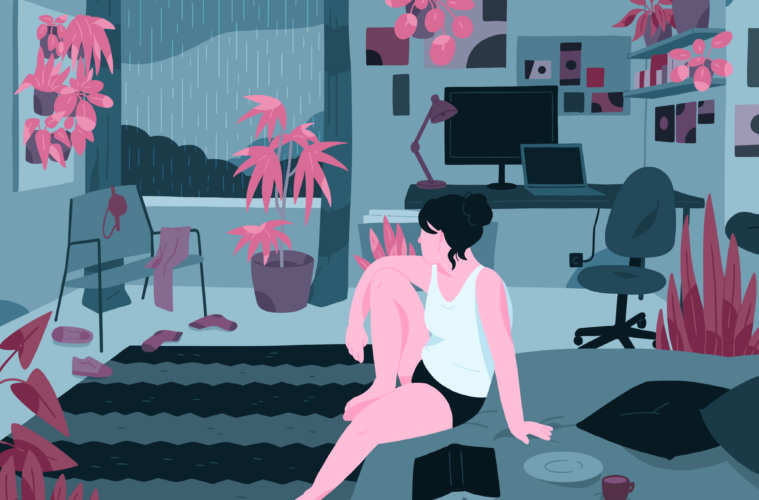Based in Hungary, Lazy Women is an online platform dedicated to all women who have been accused of laziness at least at some point in their lives. They define their mission as fighting the negative connotations of laziness and the oppression of productivity that specifically targets women.

Lazy Women is an open platform based in Hungary dedicated to all women who have been accused of laziness at least at some point in their lives.
Their mission is to challenge the negative connotation of laziness and reclaim it by making “public” the many endeavours women around the world pursue, often in the “private sphere”, which are considered less valuable than monetized or public work.
They aim to build a community that embraces the diversity of womanhood, and shares insight about lived experiences, political and social issues, successes and life stories, draw attention to experiences and issues faced by women, nudge everyone out of boredom through tutorials, recommendations, workshops and to start an intergenerational dialogue around the concept of ‘laziness.’
The founders of the Lazy Women, Zsofi and Bori talks about how they decided to establish this platform:
Let’s talk about the establishment of Lazy Women. Can you tell us how this journey started and how it continues now?
Z: It began when the pandemic hit. During the beginning of lockdown, the kind of media that women were bombarded with were always like “use this time to become the better version of yourself” or especially for women “finally you can do your work out” “come out of lockdown thinner and better”. Our website was a response to this kind of media which directs women’s focus to feel bad about themselves. : a platform where you have zero obligations, you can do, think and express whatever you want, and which gives and artistic outlet to women from all around the world.
Even though Lazy Women is often seen as Hungarian, in fact we are an international team. Our goal is to reach beyond the Hungarian audience, hence all our articles are in English. During the lockdown, we had a lot of time to work on this, so our kickstart was fast. Now it is more in the building of a community phase, where we have regularly contributing members. Apart from our online presence, we established several real-life events as well. Once the pandemic allows, we will continue to our Lazy Movement Lab in Hungary, a movement session held every Wednesday in MANYI And now in December 2022, we are proud to have created our first phsyical product, the 2022 Lazy Calendar.
Despite a lot of prejudices, many publications try to make wide and inclusive publications like Lazy Women. What were the challenges for you?
B: There are quite a few things that make it very challenging. I think one of the most challenging parts is that people are used to reading and hearing most stories from the male perspective. Hearing men’s voices in mass publications is the default, even if not explicitly mentioned. And so feminist publications are expected to be explicitly about gender, topics that are traditionally assosiated with women such as makeup, fashion, etc. or feminism, even though this is a very limited understanding of feminist media. It is also writing about regular things that we care about, such as politics, culture, etc. but from the female perspective. This is becoming more and more common,but it is still very limited in Hungarian media for example.
Another challenge of being an independent website is lack of resources. You know, most of our “competitors” have massive sources of advertising, and full time employees which makes running a website and sourcing content a lot more efficient. We have very limited sources, which definitely makes it difficult to manage day-to-day tasks such as making the website more visible, choosing titles, headlines, illustrations, and so on. We are working with incredibly talented people which helps an awful lot to be honest, such as our amazing illustrators whose work attracts a lot of attention on social media. Because you know, we are all competing for people’s attention in social media. A lot of people became regular readers from social media accounts. This is exciting for community building. But it is hard to compete with the companies pumping a lot of money into advertising, or trying to make our page as professional as we can. But this is what we are trying to do.
When I read the article “NOT BEING A MORNING PERSON DOESN’T MAKE YOU LAZY” by Zsofi, I said to myself, “Oh, I’m not alone”. How does it affect you personally to fight these “productivity, positive vibes” impositions of capitalism?
Z: I can talk about that topic for ages but I am gonna try to make it short. Personally, all the articles I have so far written in Lazy Women somehow relate to the topic of productivity, one of the main subjects around which the platform was created in the first place. The whole world of work is conceptualized in productivity terms. However, we rarely talk about the dichotomy between reproductive work and productive work. Giving voice to jobs that were never seen as productive jobs in the traditional view is also important for us. And at the end of the day, the whole topic is about choices. Enlarging the choices of all women by questioning why we choose the paths that we are on, and what happens if we don’t. It is okay if we choose a job which traditionally considered a job, and it is okay if we don’t – our value should not depend on it.
You can read the full article here.

